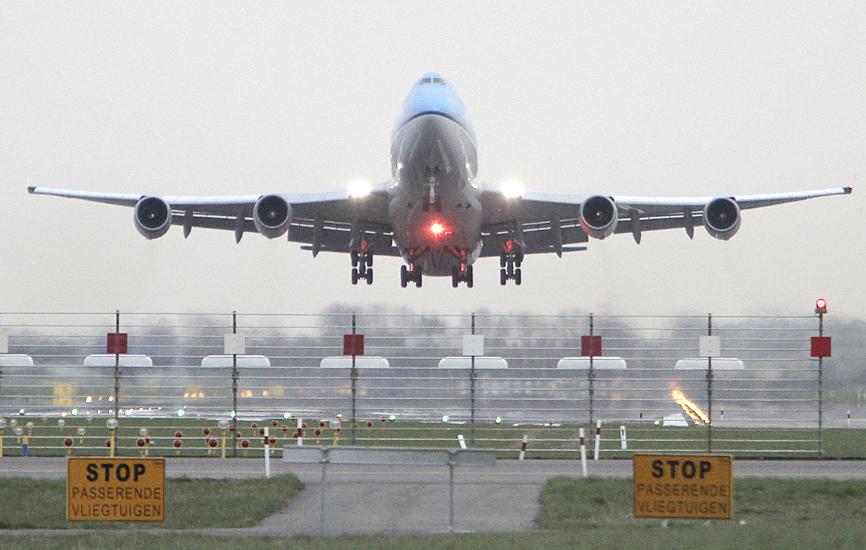The Dutch government is to halt its multibillion-euro COVID-19 bailout to national carrier KLM amid a standoff with a pilots’ union about terms of the rescue package, Dutch Minister of Finance Wopke Hoekstra said on Saturday.
The dispute, if not resolved, could have dire consequences for KLM, which employs about 30,000 people.
The company on Friday announced that it recorded a loss of 234 million euros (US$273 million) in the third quarter of this year as a result of the aviation slump caused by the COVID-19 pandemic.

Photo: AP
“Without this loan, KLM will not get through this difficult time,” chief executive Pieter Elbers said in a statement. “This makes this impasse extremely worrying.”
The Dutch government in June threw KLM a 3.4 billion euro lifeline to help the airline survive the sharp downturn in air travel amid the pandemic.
The package is made up of a 1 billion euro loan and 2.4 billion euros in guarantees for bank loans.
However, there were strings attached, including a demand that KLM cut costs by 15 percent, and improve its sustainability.
“It is up to KLM and the unions to ensure that the conditions set are still met,” Hoekstra said in a letter to the Dutch parliament.
KLM submitted a restructuring plan to the government on Oct. 1, in which labor unions representing pilots, cabin crew and ground staff agreed to pay cuts.
However, the agreements only apply until 2022; Hoekstra is seeking assurances from KLM that unions would agree to pay cuts throughout the duration of the bailout, likely five years.
KLM said five labor unions agreed to sign a “commitment clause,” saying their members would agree to pay cuts for the full duration.
It said one of the unions representing cabin and ground staff was still considering the matter, while the pilots’ union did not sign.
Hoekstra called the pilots’ stance “very disappointing and risky.”
The pilots’ union said its members already have agreed to a 20 percent pay cut and that they are committed to “continue taking responsibility to get KLM through the crisis and make it a healthy company again.”

South Korea’s equity benchmark yesterday crossed a new milestone just a month after surpassing the once-unthinkable 5,000 mark as surging global memory demand powers the country’s biggest chipmakers. The KOSPI advanced as much as 2.6 percent to a record 6,123, with Samsung Electronics Co and SK Hynix Inc each gaining more than 2 percent. With the benchmark now up 45 percent this year, South Korea’s stock market capitalization has also moved past France’s, following last month’s overtaking of Germany’s. Long overlooked by foreign funds, despite being undervalued, South Korean stocks have now emerged as clear winners in the global market. The so-called “artificial intelligence

NEW IDENTITY: Known for its software, India has expanded into hardware, with its semiconductor industry growing from US$38bn in 2023 to US$45bn to US$50bn India on Saturday inaugurated its first semiconductor assembly and test facility, a milestone in the government’s push to reduce dependence on foreign chipmakers and stake a claim in a sector dominated by China. Indian Prime Minister Narendra Modi opened US firm Micron Technology Inc’s semiconductor assembly, test and packaging unit in his home state of Gujarat, hailing the “dawn of a new era” for India’s technology ambitions. “When young Indians look back in the future, they will see this decade as the turning point in our tech future,” Modi told the event, which was broadcast on his YouTube channel. The plant would convert

‘SEISMIC SHIFT’: The researcher forecast there would be about 1.1 billion mobile shipments this year, down from 1.26 billion the prior year and erasing years of gains The global smartphone market is expected to contract 12.9 percent this year due to the unprecedented memorychip shortage, marking “a crisis like no other,” researcher International Data Corp (IDC) said. The new forecast, a dramatic revision down from earlier estimates, gives the latest accounting of the ongoing memory crunch that is affecting every corner of the electronics industry. The demand for advanced memory to power artificial intelligence (AI) tasks has drained global supply until well into next year and jeopardizes the business model of many smartphone makers. IDC forecast about 1.1 billion mobile shipments this year, down from 1.26 billion the prior

People stand in a Pokemon store in Tokyo on Thursday. One of the world highest-grossing franchises is celebrated its 30th anniversary yesterday.